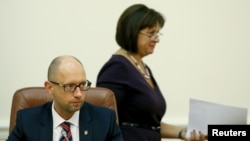Ukraine reached what its finance minister called a "win-win" deal with its largest group of creditors to ease repayments on its $18 billion debt, winning breathing space for an economy drained by the cost of fighting with pro-Russian separatists.
The agreement, which includes a write-down of 20 percent of the principal owed, ended months of tense negotiations aimed at helping to keep Ukraine on track with its International Monetary Fund-led bailout program, plugging a funding gap and preventing a unilateral debt default.
The creditors, led by Franklin Templeton and including other asset managers, accepted a small increase in the coupon on most of the bonds to 7.75 percent and extended each maturity by four years. However, it must be approved by creditors outside the group.
Ukraine said the deal, announced on Thursday, would reduce the payments due over the next four years by $11.5 billion.
This will free up funds to help the war effort in the east, support the poor, cover purchases of Russian gas over the winter period and help keep the national currency, the hryvnia, stable according to a factsheet issued by the Finance Ministry.
"Everyone's done well out of this deal. That's why it's collaborative. It's not one side winning, it's a win-win situation. We're all now moving forward without putting the value of the bonds at any further risk," Finance Minister Natalia Yaresko said late on Wednesday in remarks embargoed until Thursday.
The country's sovereign dollar bond prices surged and debt insurance costs fell after the details were released.
Ukraine and the creditors said in a joint statement they would work together "to ensure the rapid implementation of the deal."
But though Prime Minister Arseny Yatseniuk and Yaresko savored a victory after months of gloom, there was a question mark over whether the other creditors would fall in line.
The joint statement appealed to other bondholders to approve the deal and urged the international community to provide non-debt support to Ukraine in the form of grants.
In Washington, IMF chief Christine Lagarde said it was important that the agreement gained "broad support from all concerned eurobond holders."
Yaresko said she hoped it was "highly unlikely" remaining creditors would reject the agreement and forecast that the process would be wrapped up by the end of October.
Dispute with Russia ?
However, a dispute immediately took shape with Russia, one of Ukraine's main creditors which holds $3 billion of Ukrainian debt in a eurobond that falls due in December.
In a quick reaction to news of the restructuring deal, Russian Finance Minister Anton Siluanov said Moscow needed foreign currency and therefore could not participate in
Ukraine's restructuring agreement. This suggested that Moscow would insist on repayment in full of the $3 billion.
Yatseniuk, speaking at a government meeting, said Ukraine would not offer a better debt deal to Russia than to other creditors. Kiev has long insisted that the $3 billion owed to Russia is part of the sovereign and sovereign-guaranteed bonds to be restructured under the agreement.
Defaulting to Russia would carry fresh risks for Ukraine because the IMF is not officially allowed to continue lending to a country that is in default to another sovereign.
Ukraine's 2017 dollar bond issue firmed 8.7 cents to trade at 64.5 cents in the dollar on news of the deal according to Tradeweb data, while the 2022 bond rose 10 cents.
An issue maturing at the end of September, which is also subject to restructuring, rose 4.3 cents to also trade at 64 cents.
Talks had been held up by disagreement with creditors on whether to provide Kiev with a writedown on the face value of the bonds. Kyiv had initially sought a 40 percent "haircut."
In the past few weeks Kiev had suggested that if it did not get a deal it was ready to risk international disfavor and suspend repayments, effectively going into default.
Favorable
Market players endorsed the deal terms as more favorable to creditors than initially expected when Ukraine had insisted on a 40 percent writedown.
Also, while a 20 percent writedown had been broadly priced in over recent weeks, a coupon of 7.75 percent and the inclusion of GDP warrants - new instruments linked to growth-recovery — appeared to be the main drivers for a 10-11 cent rally in bond prices.
"The maturity extension was a little bit better than expected because people were thinking they would extend even longer," said one fund manager in London who holds the bond.
"And the coupon is not as low as some people fear so now everyone needs to run their spreadsheet to work out the NPV [net present value] of the bonds." NPV refers to the worth of future bond payments in current terms.
But some said the deal might not be enough to put Ukraine's economy on the right path.
"Clearly more generous to bond holders than I had thought," said Exotix credit strategist Jokob Christensen. "I have a hard time seeing how this generous deal will help reduce the debt to 71 percent of GDP in 2020, which is one of the crucial targets in the operation."
Gabriel Sterne, head of global macro at Oxford Economics also cast doubt on whether the deal would make Ukraine's debt levels sustainable and added: "There is a strong likelihood that they will be back at negotiating table in before too many IMF reviews have passed."





